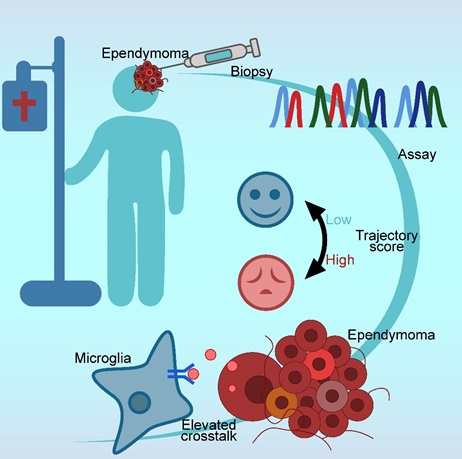Ependymomas (EPNs) are primary tumors of the central nervous system that commonly present in childhood. With the advent of high-throughput single-cell RNA sequencing technologies, recent studies have provided resources for understanding the molecular landscape of EPN, revealing a cellular hierarchy in these tumor cells characterized by an undifferentiated progenitor population which transitions into distinct cell lineages. To date, cellular heterogeneity has typically been viewed as a consequence of hyperproliferation and genomic instability that can give rise to intra-tumoral subclones during tumor progression. In particular, mutant genotypes can grant selective advantage on specific cellular subclones, leading to their outgrowth and allowing them to establish dominance in different types of tissue environments. Hence, the research of the therapeutic potential of targeted treatments for EPN subclones is of great urgence.
Recently, a study published in Frontiers in Immunology (DOI: 10.3389/fimmu.2022.903246), led by Dr. WU Qingfeng from Institute of Genetics and Developmental Biology, Chinese Academy of Sciences (CAS), revealed that immune cell crosstalk is upregulated in relapsed EPN patients with poorer survival outcome.
In this study, the researchers generated a high-resolution single-cell dataset of pediatric ependymoma with a particular focus on the comparison of subclone differences within tumors, and show upregulation of cilium-associated genes in more highly differentiated subclone populations. As a proxy to traditional pseudotime analysis, they applied a novel trajectory scoring method to reveal cellular compositions associated with poor survival outcomes across primary and relapsed patients. Furthermore, using the trajectory score, researchers identified putative cell-cell communication features and show upregulation of pathways associated with immune cell crosstalk in patients with poorer survival outcome. Taken together, this approach will complement existing published datasets and provide valuable insights into subclone-specific properties of EPN, laying the foundation for therapeutic treatments of this disease.

The trajectory score and elevated immune crosstalk in relapsed ependymoma (Image by IGDB)
Contact:
WU Haoda from Dr. WU Qingfeng’s group
Institute of Genetics and Developmental Biology, Chinese Academy of Sciences

 CAS
CAS
 中文
中文




.png)
